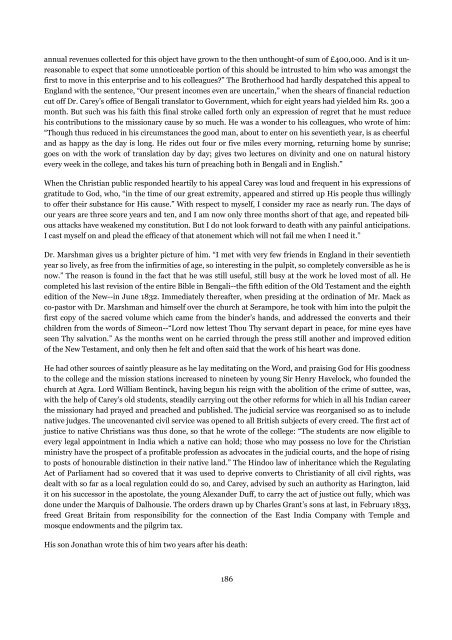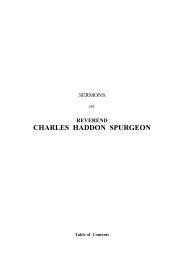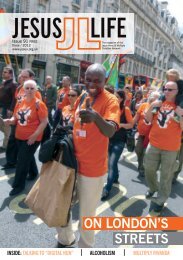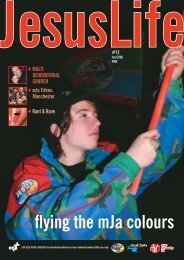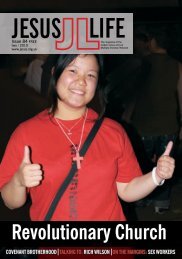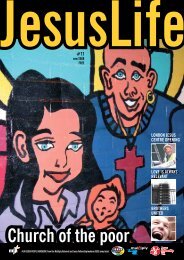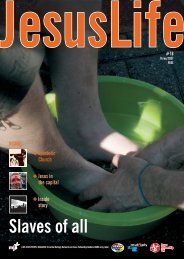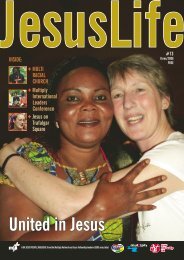Life of William Carey by George Smith - The Jesus Army
Life of William Carey by George Smith - The Jesus Army
Life of William Carey by George Smith - The Jesus Army
You also want an ePaper? Increase the reach of your titles
YUMPU automatically turns print PDFs into web optimized ePapers that Google loves.
annual revenues collected for this object have grown to the then unthought-<strong>of</strong> sum <strong>of</strong> £400,000. And is it unreasonable<br />
to expect that some unnoticeable portion <strong>of</strong> this should be intrusted to him who was amongst the<br />
first to move in this enterprise and to his colleagues?” <strong>The</strong> Brotherhood had hardly despatched this appeal to<br />
England with the sentence, “Our present incomes even are uncertain,” when the shears <strong>of</strong> financial reduction<br />
cut <strong>of</strong>f Dr. <strong>Carey</strong>’s <strong>of</strong>fice <strong>of</strong> Bengali translator to Government, which for eight years had yielded him Rs. 300 a<br />
month. But such was his faith this final stroke called forth only an expression <strong>of</strong> regret that he must reduce<br />
his contributions to the missionary cause <strong>by</strong> so much. He was a wonder to his colleagues, who wrote <strong>of</strong> him:<br />
“Though thus reduced in his circumstances the good man, about to enter on his seventieth year, is as cheerful<br />
and as happy as the day is long. He rides out four or five miles every morning, returning home <strong>by</strong> sunrise;<br />
goes on with the work <strong>of</strong> translation day <strong>by</strong> day; gives two lectures on divinity and one on natural history<br />
every week in the college, and takes his turn <strong>of</strong> preaching both in Bengali and in English.”<br />
When the Christian public responded heartily to his appeal <strong>Carey</strong> was loud and frequent in his expressions <strong>of</strong><br />
gratitude to God, who, “in the time <strong>of</strong> our great extremity, appeared and stirred up His people thus willingly<br />
to <strong>of</strong>fer their substance for His cause.” With respect to myself, I consider my race as nearly run. <strong>The</strong> days <strong>of</strong><br />
our years are three score years and ten, and I am now only three months short <strong>of</strong> that age, and repeated bilious<br />
attacks have weakened my constitution. But I do not look forward to death with any painful anticipations.<br />
I cast myself on and plead the efficacy <strong>of</strong> that atonement which will not fail me when I need it.”<br />
Dr. Marshman gives us a brighter picture <strong>of</strong> him. “I met with very few friends in England in their seventieth<br />
year so lively, as free from the infirmities <strong>of</strong> age, so interesting in the pulpit, so completely conversible as he is<br />
now.” <strong>The</strong> reason is found in the fact that he was still useful, still busy at the work he loved most <strong>of</strong> all. He<br />
completed his last revision <strong>of</strong> the entire Bible in Bengali--the fifth edition <strong>of</strong> the Old Testament and the eighth<br />
edition <strong>of</strong> the New--in June 1832. Immediately thereafter, when presiding at the ordination <strong>of</strong> Mr. Mack as<br />
co-pastor with Dr. Marshman and himself over the church at Serampore, he took with him into the pulpit the<br />
first copy <strong>of</strong> the sacred volume which came from the binder’s hands, and addressed the converts and their<br />
children from the words <strong>of</strong> Simeon--“Lord now lettest Thou Thy servant depart in peace, for mine eyes have<br />
seen Thy salvation.” As the months went on he carried through the press still another and improved edition<br />
<strong>of</strong> the New Testament, and only then he felt and <strong>of</strong>ten said that the work <strong>of</strong> his heart was done.<br />
He had other sources <strong>of</strong> saintly pleasure as he lay meditating on the Word, and praising God for His goodness<br />
to the college and the mission stations increased to nineteen <strong>by</strong> young Sir Henry Havelock, who founded the<br />
church at Agra. Lord <strong>William</strong> Bentinck, having begun his reign with the abolition <strong>of</strong> the crime <strong>of</strong> suttee, was,<br />
with the help <strong>of</strong> <strong>Carey</strong>’s old students, steadily carrying out the other reforms for which in all his Indian career<br />
the missionary had prayed and preached and published. <strong>The</strong> judicial service was reorganised so as to include<br />
native judges. <strong>The</strong> uncovenanted civil service was opened to all British subjects <strong>of</strong> every creed. <strong>The</strong> first act <strong>of</strong><br />
justice to native Christians was thus done, so that he wrote <strong>of</strong> the college: “<strong>The</strong> students are now eligible to<br />
every legal appointment in India which a native can hold; those who may possess no love for the Christian<br />
ministry have the prospect <strong>of</strong> a pr<strong>of</strong>itable pr<strong>of</strong>ession as advocates in the judicial courts, and the hope <strong>of</strong> rising<br />
to posts <strong>of</strong> honourable distinction in their native land.” <strong>The</strong> Hindoo law <strong>of</strong> inheritance which the Regulating<br />
Act <strong>of</strong> Parliament had so covered that it was used to deprive converts to Christianity <strong>of</strong> all civil rights, was<br />
dealt with so far as a local regulation could do so, and <strong>Carey</strong>, advised <strong>by</strong> such an authority as Harington, laid<br />
it on his successor in the apostolate, the young Alexander Duff, to carry the act <strong>of</strong> justice out fully, which was<br />
done under the Marquis <strong>of</strong> Dalhousie. <strong>The</strong> orders drawn up <strong>by</strong> Charles Grant’s sons at last, in February 1833,<br />
freed Great Britain from responsibility for the connection <strong>of</strong> the East India Company with Temple and<br />
mosque endowments and the pilgrim tax.<br />
His son Jonathan wrote this <strong>of</strong> him two years after his death:<br />
186


